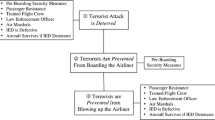Abstract
Our survey results demonstrate that targeted screening of airline passengers raises conflicting concerns of efficiency and equity. Support for profiling increases if there is a substantial reduction in avoided delays to other passengers. The time cost and benefit components of targeting affect support for targeted screening in an efficiency-oriented manner. Nonwhite respondents are more reluctant than whites to support targeting or to be targeted. Terrorism risk assessments are highly diffuse, reflecting considerable risk ambiguity. People fear highly severe worst case terrorism outcomes, but their best estimates of the risk are more closely related to their lower bound estimates than their upper bound estimates. Anomalies evident in other risk perception contexts, such as hindsight biases and embeddedness effects, are particularly evident for terrorism risk beliefs.
Similar content being viewed by others
References
Camerer, Colin F. and Weber, Martin. (1992). "Recent Developments in Modeling Preferences: Uncertainty and Ambiguity," Journal of Risk and Uncertainty 5, 325–370.
Fischhoff, Baruch. (1975). “Hindsight ≠ Foresight: The Effect of Outcome Knowledge on Judgment UnderUncertainty,” Journal of Experimental Psychology, Human Perceptions and Performance 1, 288–299.
Fischhoff, Baruch et al. (1981). Acceptable Risk. Cambridge: Cambridge University Press.
Kahneman, Daniel and Jack L. Knetsch. (1992). "Valuing Public Goods: The Purchase of Moral Satisfaction," Journal of Environmental Economics and Management 22, 57–70.
Kaplow, Louis and Steven, Shavell. (2002). Fairness and Welfare. Cambridge: Harvard University Press.
Kelman, Mark, David Fallas, and Hilary Folger. (1998). "Decomposing Hindsight Bias," Journal of Risk and Uncertainty 16, 251–269.
Kunreuther, Howard et al. (1978). Disaster Insurance Protection: Public Policy Lessons. New York: John Wiley.
Rachlinski, Jeffrey. (1998). "A Positive Psychological Theory of Judging in Hindsight," University of Chicago Law Review 65(2), 571–625.
Sunstein, Cass, Reid Hastie, John Payne, David Schkade, and W. Kip Viscusi. (2002). Punitive Damages: How Juries Decide. Chicago: University of Chicago Press.
Viscusi, W. Kip. (1997). "Alarmist Decisions with Divergent Risk Information," The Economic Journal 445, 1657–1670.
Viscusi, W. Kip. (1998). Rational Risk Policy. Oxford: Oxford University Press.
Author information
Authors and Affiliations
Rights and permissions
About this article
Cite this article
Viscusi, W.K., Zeckhauser, R.J. Sacrificing Civil Liberties to Reduce Terrorism Risks. Journal of Risk and Uncertainty 26, 99–120 (2003). https://doi.org/10.1023/A:1024111622266
Issue Date:
DOI: https://doi.org/10.1023/A:1024111622266




